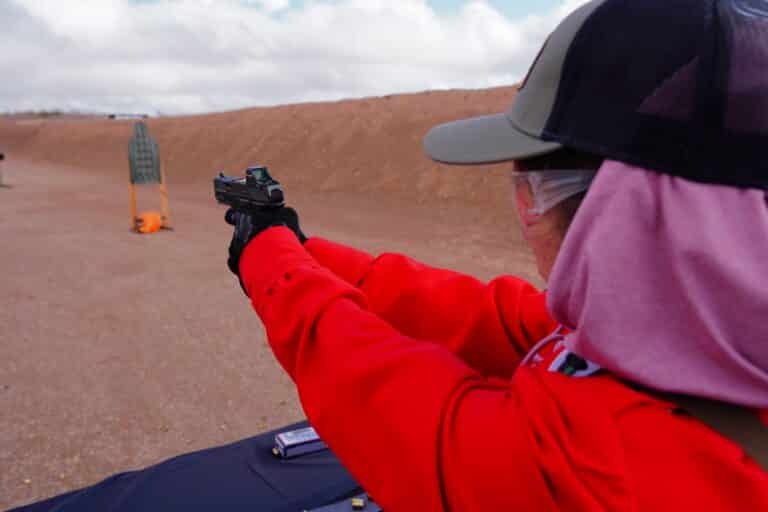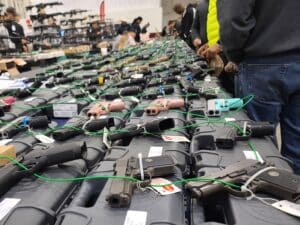Maryland’s requirement that residents pass a set of requirements before buying a handgun violates the Second Amendment.
That’s the ruling a panel of Fourth Circuit judges handed down on Tuesday. In a 2-1 vote, the appeals court found the state’s restrictions directly burden citizens’ gun rights. It concluded that burden wasn’t justified under the test set out in the Supreme Court’s 2022 ruling in New York State Rifle and Pistol Association v. Bruen.
“Maryland’s law fails the new Bruen test,” Judge Julius N. Richardson wrote for the majority in Maryland Shall Issue v. Moore. “As we will explain, Plaintiffs have shown that Maryland’s handgun-licensure law regulates a course of conduct protected by the Second Amendment, and Maryland has not established that the law is consistent with our Nation’s historical tradition.”
The ruling is the latest major fallout from the High Court’s Bruen ruling. The landmark case has thrown gun restrictions at every level into question, especially the strictest regulations in deep blue states.
Tuesday’s ruling will also likely have a practical effect on Maryland gun buyers. The order blocking the law is set to go into effect within three weeks. However, Maryland has 14 days to request review from the full panel of the Fourth Circuit. The state could also appeal to the Supreme Court. If it does, that would likely result in the ruling being stayed until the end of those appeals.
Thomas Lester, a spokesperson for Maryland Attorney General Anthony G. Brown (D.), told The Reload his office is “weighing options for next steps in this case, which prevents us from any further comment at this point.”
Judge Richardson, a Donald Trump appointee, wrote Maryland’s handgun qualification license requires pistol buyers to “follow a long and winding path” to get one. He argued that violates their “right to keep and bear arms” because buying is a vital component to keeping and bearing. He also ruled the fact that the licensing requirements were objective and attainable didn’t save the law because it still keeps law-abiding Marylanders from owning pistols–at least temporarily.
“[E]ven though Maryland’s law does not prohibit Plaintiffs from owning handguns at some time in the future, it still prohibits them from owning handguns now,” he wrote. “In order to get a handgun, Plaintiffs still have to follow all of the law’s steps. And, although they will be able to complete each one, it is impossible to do so right away. Plaintiffs can’t receive a license to legally acquire a handgun until the state reviews their applications, which can take up to thirty days.”
He concluded that “no matter what Plaintiffs do, there will be a period of up to thirty days where their ability to get a handgun is completely out of their control” and that waiting period “could well be the critical time in which the applicant expects to face danger.” That was enough for him to conclude the law impacts the plaintiffs’ Second Amendment rights.
Maryland didn’t fair any better in Judge Richardson’s analysis of whether that impact was justified by America’s tradition of gun regulation, as required by the Bruen test. He argued the state’s historical evidence was “scant at best.”
“Indeed, Maryland admitted at oral argument that it had not presented a proper historical analogue for the challenged law, noting that it had identified no Founding-era laws that ‘required advance permission’ before a citizen could purchase a firearm,” Judge Richardson wrote.
Instead, he said the state relied on modern laws that prevent “dangerous” people, such as convicted felons, from owning guns. The state argued the same historical laws that justify those modern prohibitions could fit with the handgun qualification license. Although the state didn’t produce many examples of historical bans on dangerous people buying guns, Judge Richardson argued that tradition wouldn’t save Maryland’s law anyway.
“Though Maryland has not mustered independent historical support for a ‘dangerousness’ exception, other judges have thoroughly canvassed the historical record,” he wrote. “And they tend to agree that history and tradition support an exception affording legislatures’ the power to prohibit dangerous people from possessing guns.’ But even if the modern federal prohibitions that Maryland cites are all constitutional—because they fit within a historical tradition allowing states to prohibit ‘dangerous’ people from owning firearms—that says nothing about Maryland’s law. That is because its law is not ‘relevantly similar’ to the laws allegedly comprising that tradition.”
Judge Richardson argued the burden of prohibiting people with certain convictions or who’ve been involuntarily committed from having handguns after the fact presents a “markedly different” burden on Second Amendment rights than blocking everyone from having them, “even if only temporarily,” to attempt to weed out those who are dangerous.
“The modern federal laws that Maryland has cited, and the historical laws allegedly supporting a tradition of prohibiting dangerous people from owning firearms, all acted through one mechanism: punishing certain classes of supposedly ‘dangerous’ people if they don’t give up their arms or prove they are not dangerous,” he wrote. “But that is a different mechanism than making every person seek the government’s permission before they can even acquire arms. Preemptively disarming every person until they can each prove that they are not dangerous burdens a far broader swath of people.”
Judge Barbara Milano Keenan, a Barack Obama appointee, dissented. She argued the state’s pistol purchase law was in line with other shall-issue permitting regimes the Supreme Court elected not to strike down in Bruen, and Justices Brett Kavanaugh and John Roberts defended in a concurrence.
“Like the shall-issue regimes contemplated by the Supreme Court in Bruen, the [handgun qualification license] requirement allows any law-abiding, responsible person who seeks to obtain a handgun qualification license to do so by completing the objective criteria outlined in the statute,” she wrote. “The state does not retain any governmental discretion or ability to exercise judgment with regard to an individual’s application for a handgun qualification license, and the state may not deny an individual a license once the statutory requirements have been satisfied.”
She also said the majority was wrong to elevate protections for owning guns above those for carrying them. She argued the Supreme Court has leveled the playing field for protections on keeping and bearing arms, which she said means restrictions on one can apply to the other.
“[T]he majority attempts to frame the Supreme Court’s shall-issue discussion as irrelevant because the New York law at issue in Bruen was a restriction on ‘public carry,’ while Maryland’s law’ limit[s] handgun possession altogether,'” Judge Keenan wrote. “But this distinction turns on a false premise, namely, that there is a difference between the Second Amendment right to keep arms and the Second Amendment right to bear arms. Neither the text of the Second Amendment nor the Supreme Court’s precedent supports such a reading. Thus, the majority cannot discard the language in the Court’s shall-issue discussion on the basis that the Court was addressing only shall-issue public carry laws.”
She also suggested the case should have been remanded back down to the lower court to allow time for the state to offer more historical analogues for consideration and to answer questions on severability. The majority responded in a footnote by rejecting the idea as unnecessary, saying, “We will not return the parties to the district court just to push more paper around.”
Ultimately, Judge Richardson argued Maryland’s law simply isn’t compatible with the Second Amendment.
“It is not our place, as a court, to judge a law’s wisdom or weigh competing policy values. After all, ‘[t]he Second Amendment is the very product of an interest balancing by the people,'” he wrote, citing the Bruen ruling. “If they disapprove, then the people can draw a different balance using Article V’s amendment process. But, under the Second Amendment’s current balance, Maryland’s law cannot survive. Even assuming a historical tradition of prohibiting ‘dangerous’ people from owning firearms, Maryland chose a different mechanism, and thus imposed different burdens, from the historical analogues that it asserts.”







Only Members can view comments. Become a member today to join the conversation.